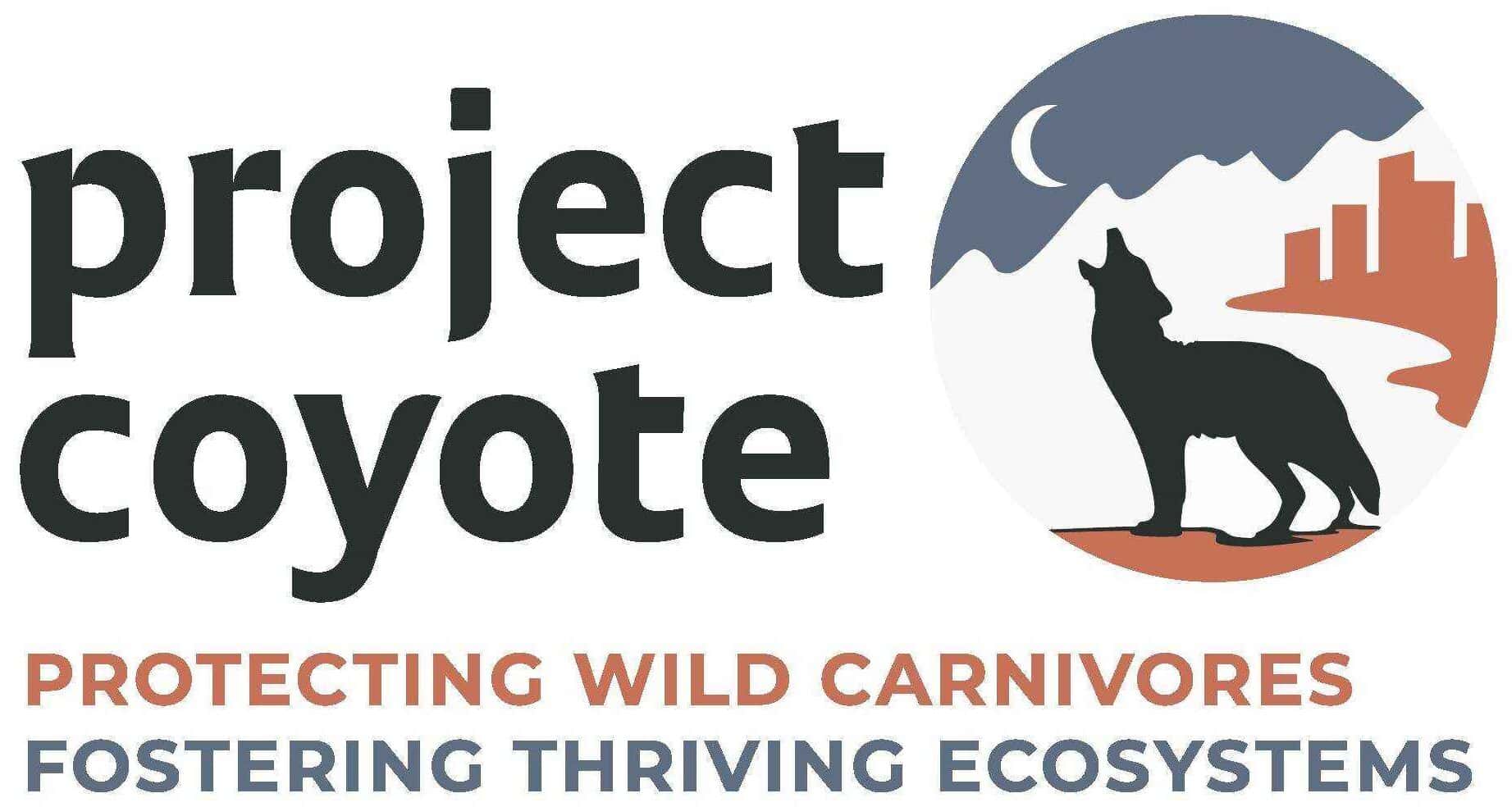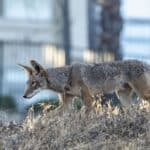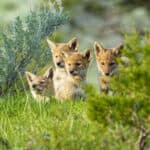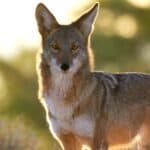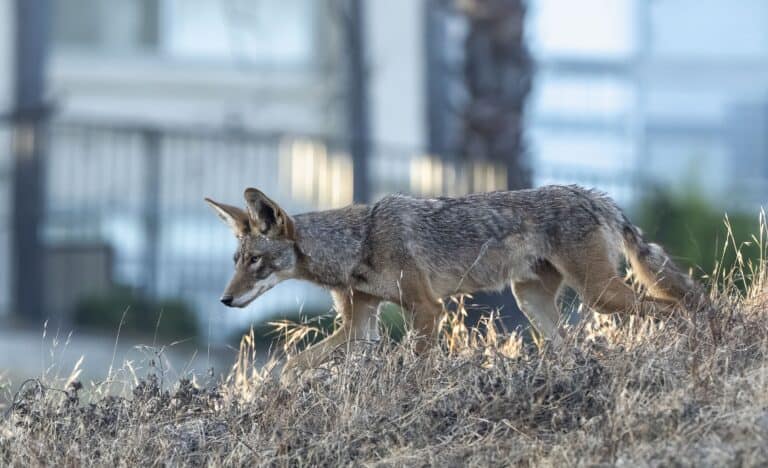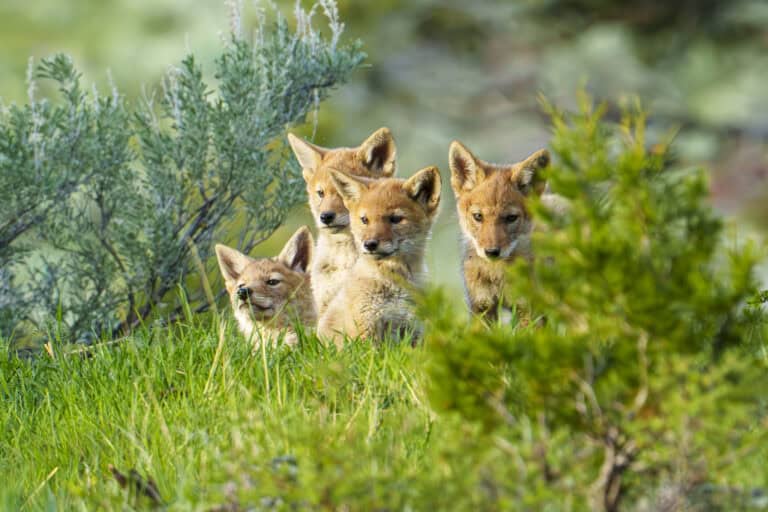March 21, 2023
We are deeply saddened by the deaths of Cisco and Blaze caused by wolves last week, and want to extend our sincere condolences to their human and nonhuman families. Most of us at Project Coyote have beloved dog family members, and these incidents touch us intimately.
These unfortunate incidents lay bare the tragic truth that killing only begets more killing. Although we do not have confirmation that the incidents involve the same wolves, the conflict occurred in Jackson County, which is home to the North Park pack who likely experienced the loss of two of their own pups last year and who were wrongly accused of killing an impossible number of cows. As cutting edge scientific studies are increasingly revealing, human-caused mortality destabilizes wolf families. The tragic losses of Cisco and Blaze may be the result of a wolf family under attack from all sides and more desperately defending a territory and a forthcoming vulnerable litter of pups.
Such events underscore the need to provide all individuals sharing landscapes with wolves with the appropriate education and tools to prevent them. Most scientific research today suggests the deployment of an array of non-lethal tools is the most consistently effective way to prevent these types of incidents, including barriers such as fencing or fladry, human presence and light/sound deterrents. That is especially true when comparing the effectiveness of non-lethal methods in the scientific literature to lethal methods, which have been found to be highly variable and even counterproductive for preventing incidents. Lethal methods in response to incidents may exacerbate conflict through the disruption of wolf families, which often disband after they lose a member to human-caused killing. Such break up of wolf families increases the risk that otherwise cooperative hunters that prefer wild prey will turn to domesticated animals. Killing wolves is not the correct answer. Had the North Park wolves been met with peaceful coexistence, Cisco and Blaze may be alive today.
However, that does not mean that non-lethal methods will prevent all incidents, always, or that effectiveness and risk are evenly distributed across methods. Livestock guarding dogs have been promoted as a non-lethal technique, but generally without considering the incredible risk it places on dogs, which can be high. Wolves can perceive dogs as competitors, which increases the likelihood of an aggressive response. The deaths of Cisco and Blaze should give all of us pause in suggesting such ‘methods’, especially without nearby human presence, protection (such as protective collars) or alongside other deterrents that would prevent the encounter in the first place.
Another side of this story is that the wolves involved in this incident were not reintroduced, but migrated to Colorado. Later this year, Colorado will become the first state to reintroduce wolves pursuant to a statewide ballot initiative. As with many, if not all reintroduction efforts, the Colorado reintroduction effort seems motivated by humans’ desire to bring wolves back, at the expense of the wellbeing of individual wolves. These incidents should invite reflection, on our part and others as advocates for animals, on the complexities and risks of intervening with wild lives that may be harmed by, and harm, others. We say this not to vilify wolves or other predators. We say this to recognize that human hubris in treating wild nature as if it were a simulation game makes us culpable in the consequences of the interventions we enact. We should question our right to intervene in the lives of other beings based on our desire to hear wolves nearby, or use them to restore an ecosystem suffering due to our previous efforts to eradicate them, and instead foreground the wellbeing of wolves and those affected by them within the policy process. We also must acknowledge our mass killing of wolves is why our ecosystems are suffering in the first place and why recovery of a species that used to roam the state widely is necessary.
Project Coyote has been involved in attempting to improve the reintroduction plan, to mitigate harm to all beings while ensuring that wolves can reach effective densities to bring the ecosystem benefits that are good for healthy, wild systems. Unfortunately, wildlife managers are failing to provide Coloradans with the appropriate education and tools to mitigate conflict. So our thinking is evolving as it becomes more clear that Colorado’s plan will not set wolves or humans up for success. Non-lethal tools to prevent conflict are not being required and wolves may even be subject to lethal control on public lands. Wolves are not being adequately protected and instead will likely be considered “experimental, non-essential” and subject to all the lethal control that comes with that designation. Upon reflection, we are given pause in our support for interventions into the lives of vulnerable others, especially when those interventions are as invasive as killing or ‘reintroducing’ them with little to no protections in place. Might does not make right. Maybe rewilding provides a better answer on how to encourage the flourishing of wild nature, and a more humble and respectful relationship to wild beings. For us, rewilding requires fostering coexistence through all landscapes.
Coexistence, and rewilding, is a process in which we recognize the dignity and right of other beings to flourish alongside us, while mitigating negative interactions in the least harmful way. Coexistence is a path without an end, of constant improvement and many requirements. It requires the desire to share: landscape, resources and, importantly, risk. It requires letting go of desires to dominate and oppress vulnerable others. It requires effort, to educate ourselves, change behaviors and ways of thinking. It also requires a recognition that some negative interactions will occur, without those leading to fear mongering that stereotypes, vilifies and breeds hatred towards other beings. That is as true with humans and with other animals.
We have seen time and time again how some media personalities denigrate and vilify vulnerable others, be them people of color, women, trans people, bears or wolves. Here is a perfect example of what ecofeminists, trans, queer, BIPOC and animal academics have noted for decades now: that there are deep philosophical and psychological connections between worldviews dismissive of human ‘others’ (non-male, non-white, non-hetero, non-binary, differently-abled) and animal ‘others’ (non-humans). Such perspective and rhetoric is nothing but harmful, and we encourage everyone to seek more caring, respectful and fair perspectives and experiences.
If we are to learn from this tragedy and protect our beloved family and working dogs, we must ask hard questions. Is it justified to allow dogs to roam freely in a world of myriad dangers, including the traps, poisons and snares that target wild canids like coyotes and wolves? Conversely, is it justified to abduct wolves and move them into areas that are not only unfamiliar, but actively hostile to them? Is what we’re gaining worth the health and wellbeing of others? Do we need to question more often our desire to intervene in the natural world?
We must also be consistent in recognizing the intrinsic value of all life, whether domestic or wild. Our dogs deserve care and need our protection, so do wolves and all canids.
Rest in peace, dear Cisco and Blaze. We promise to do better.
“Dogs’ lives are too short. Their only fault, really.” – Agnes Sligh Turnbull
Francisco J. Santiago-Ávila, PhD
Science & Conservation Manager
Michelle Lute, PhD
Carnivore Conservation Director
Renee Seacor, JD
Carnivore Conservation Advocate
